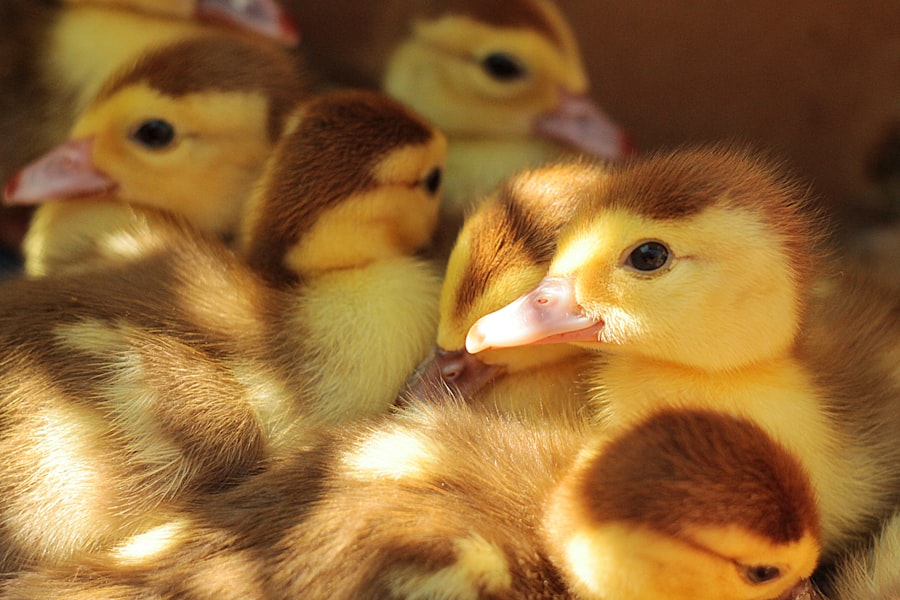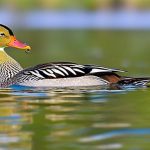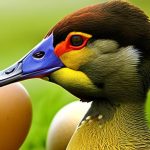Breeding ducks for egg production is becoming increasingly popular among farmers and homesteaders. Ducks offer several benefits over chickens when it comes to egg production. They are known for their high egg-laying capabilities, with some breeds laying up to 300 eggs per year. Additionally, duck eggs are larger and have a richer flavor compared to chicken eggs, making them a favorite among many consumers.
Ducks are also a great alternative to chickens for egg production because they are hardy and adaptable. They can thrive in a variety of climates and are less prone to diseases compared to chickens. Ducks are also excellent foragers, which means they can find a significant portion of their own food if given access to a suitable environment. This makes them a cost-effective option for egg production.
Key Takeaways
- Breeding ducks for egg production can be a profitable venture.
- Selecting the right breed of ducks is crucial for high egg production.
- A clean and comfortable breeding environment is necessary for healthy ducks.
- Proper feeding and nutrition are essential for egg-laying ducks.
- Breeding and mating techniques, as well as incubation and hatching, require careful attention for successful egg production.
Selecting the right breed of ducks for egg production
When it comes to selecting the right breed of ducks for egg production, there are several factors to consider. Different duck breeds have varying egg-laying capabilities, so it’s important to choose a breed that meets your specific needs and goals.
Some popular duck breeds known for their high egg production include the Khaki Campbell, Indian Runner, and Welsh Harlequin. These breeds can lay up to 300 eggs per year, making them ideal for commercial egg production. Other breeds such as the Pekin and Rouen ducks are also good layers but may not produce as many eggs as the aforementioned breeds.
In addition to egg-laying capabilities, it’s important to consider other factors such as temperament, size, and adaptability when choosing a breed for egg production. Some breeds may be more docile and easier to handle, while others may be more active and require more space. It’s important to choose a breed that fits well with your specific farming or homesteading setup.
Preparing the breeding environment for ducks
Creating a suitable housing area for ducks is essential for successful breeding and egg production. Ducks require a clean, dry, and well-ventilated environment to thrive. The housing area should provide protection from predators and extreme weather conditions.
When setting up a housing area for ducks, it’s important to provide enough space for them to move around comfortably. Ducks are active animals and need room to exercise and forage. A general rule of thumb is to provide at least 4 square feet of floor space per duck.
It’s also important to provide nesting boxes or areas where ducks can lay their eggs. These should be clean, dry, and secluded to encourage egg-laying behavior. Ducks prefer dark and quiet areas for nesting, so providing suitable nesting boxes will help ensure that they feel safe and secure.
Feeding and nutrition requirements for egg-laying ducks
A balanced diet is crucial for optimal egg production in ducks. Ducks require a diet that is high in protein, vitamins, and minerals to support their egg-laying capabilities. A commercial duck feed that is specifically formulated for egg-laying ducks is recommended.
In addition to commercial feed, ducks should also have access to fresh water at all times. Ducks require water for digestion and to keep their bills clean, which is important for maintaining good health. It’s also a good idea to provide a shallow water source such as a pond or pool where ducks can swim and clean themselves.
Supplements such as oyster shell or crushed eggshells should also be provided to ensure that ducks have enough calcium for producing strong eggshells. Calcium deficiency can lead to thin or weak shells, which can result in cracked or broken eggs.
Breeding and mating techniques for ducks
Understanding the breeding cycle of ducks is important for successful mating and breeding. Ducks are seasonal breeders, meaning they are more likely to mate during certain times of the year when environmental conditions are favorable.
To encourage successful mating, it’s important to provide a suitable environment for ducks to engage in courtship behavior. This includes providing enough space for males to display their courtship rituals and for females to choose a mate. It’s also important to provide suitable nesting areas where females can lay their eggs.
Ducks are known for their unique mating behavior, which involves the male duck chasing and mounting the female duck. This behavior is completely normal and should not be interrupted unless it becomes aggressive or harmful to the female. It’s important to allow ducks to engage in their natural mating behavior to ensure successful breeding.
Incubation and hatching of duck eggs

Once ducks have successfully mated and laid their eggs, it’s important to understand the incubation process for duck eggs. Duck eggs typically take around 28 days to hatch, although this can vary depending on the breed and environmental conditions.
Duck eggs can be incubated using a commercial incubator or by using a broody duck. If using an incubator, it’s important to maintain a consistent temperature and humidity level throughout the incubation period. The ideal temperature for incubating duck eggs is around 99-101 degrees Fahrenheit, with a humidity level of around 55-60%.
If using a broody duck, it’s important to provide a suitable nesting area where the duck can sit on her eggs undisturbed. The broody duck will naturally regulate the temperature and humidity levels needed for successful incubation. It’s important to provide fresh food and water for the broody duck during this time.
Tips for successful hatching and caring for ducklings include ensuring that the incubator or nesting area is clean and free from any contaminants. It’s also important to handle the eggs with clean hands and avoid any sudden movements or disturbances that could harm the developing embryos.
Caring for ducklings after hatching
Caring for newly hatched ducklings is essential for their health and well-being. Ducklings are fragile and require special care during their first few weeks of life.
It’s important to provide a warm and dry environment for ducklings, as they are susceptible to cold temperatures and drafts. A brooder box or area with a heat lamp or heat pad can provide the necessary warmth for ducklings. The temperature should be around 90-95 degrees Fahrenheit for the first week, and then gradually decreased by 5 degrees each week until the ducklings are fully feathered.
Ducklings also require a balanced diet that is high in protein to support their growth and development. A commercial duckling feed that is specifically formulated for young ducks is recommended. It’s important to provide fresh water at all times, making sure that it is shallow enough for the ducklings to drink without drowning.
Maximizing egg production in ducks
To maximize egg production in ducks, there are several strategies that can be implemented. Providing a balanced diet, suitable housing, and a stress-free environment are key factors in ensuring consistent egg production.
It’s important to monitor the health of the ducks regularly and address any issues promptly. Regular veterinary check-ups and vaccinations can help prevent common health issues that may affect egg production.
Maintaining a consistent lighting schedule can also help stimulate egg production in ducks. Ducks require around 14-16 hours of light per day to maintain optimal egg-laying capabilities. Supplemental lighting can be used during the winter months when natural daylight is limited.
Preventing and treating common health issues in egg-laying ducks
Egg-laying ducks are susceptible to several common health issues that can affect their egg production. It’s important to be aware of these issues and take preventative measures to ensure the health and well-being of the ducks.
Some common health issues in egg-laying ducks include respiratory infections, parasites, and egg-binding. Respiratory infections can be prevented by providing a clean and well-ventilated housing area. Regular cleaning and disinfection of the housing area can help prevent the spread of diseases.
Parasites such as mites and lice can be controlled by regularly inspecting the ducks for signs of infestation and treating them with appropriate medications. It’s important to follow the instructions on the medication label and consult with a veterinarian if necessary.
Egg-binding is a condition where a duck is unable to lay her eggs. This can be caused by various factors such as calcium deficiency, obesity, or genetic predisposition. Providing a balanced diet and ensuring that ducks have access to enough calcium can help prevent egg-binding. If a duck is experiencing difficulty laying eggs, it’s important to seek veterinary assistance as soon as possible.
Marketing and selling duck eggs for profit
Breeding ducks for egg production can also be a profitable venture. There are several opportunities for selling duck eggs, including direct sales to consumers, farmers markets, and local restaurants or bakeries.
When marketing and selling duck eggs, it’s important to highlight their unique qualities such as their larger size and richer flavor compared to chicken eggs. Many consumers are willing to pay a premium for duck eggs due to their superior taste and nutritional value.
Building relationships with local businesses such as restaurants or bakeries can also be beneficial for selling duck eggs. These establishments often have a high demand for specialty eggs and may be willing to pay a higher price for them.
Breeding ducks for egg production offers several benefits over chickens. Ducks are known for their high egg-laying capabilities, adaptability, and unique flavor of their eggs. Selecting the right breed, providing a suitable environment, and ensuring proper nutrition are key factors in successful egg production. By following the tips and strategies outlined in this article, farmers and homesteaders can enjoy the rewards of breeding ducks for egg production.
If you’re interested in breeding ducks for eggs, you may also want to check out this informative article on poultrywizard.com. It discusses the benefits of using a snaplock chicken coop for your ducks, providing them with a safe and secure environment to lay their eggs. The article also explores the possibility of keeping guinea fowl alongside chickens and the compatibility between the two species. Additionally, it delves into the dietary preferences of quails, specifically focusing on the vegetables that are suitable for their consumption. To learn more about these topics and enhance your knowledge on duck breeding, click here: https://poultrywizard.com/keeping-chickens/snaplock-chicken-coop/, https://poultrywizard.com/keeping-guinea-fowl/can-guinea-fowl-live-with-chickens/, https://poultrywizard.com/keeping-quail/what-vegetables-do-quails-eat/.
FAQs
What is breeding ducks for eggs?
Breeding ducks for eggs is the process of raising ducks specifically for the purpose of producing eggs for consumption or sale.
What are the benefits of breeding ducks for eggs?
Breeding ducks for eggs can provide a sustainable source of protein and income. Duck eggs are also known to be richer in nutrients compared to chicken eggs.
What are the common breeds of ducks used for egg production?
The most common breeds of ducks used for egg production are the Khaki Campbell, Indian Runner, and the Welsh Harlequin.
What are the ideal conditions for breeding ducks for eggs?
Breeding ducks for eggs require a clean and spacious coop or pen with access to clean water for swimming and drinking. They also need a balanced diet and protection from predators.
How often do ducks lay eggs?
Ducks typically lay eggs every other day, with peak production occurring during the spring and summer months.
How long do ducks lay eggs?
Ducks can lay eggs for up to 5 years, but their egg production may decrease after the first 2 years.
How do you collect and store duck eggs?
Duck eggs should be collected daily and stored in a cool and dry place with the pointed end facing downwards. They can be stored for up to 2 weeks in the refrigerator.
Meet Walter, the feathered-friend fanatic of Florida! Nestled in the sunshine state, Walter struts through life with his feathered companions, clucking his way to happiness. With a coop that’s fancier than a five-star hotel, he’s the Don Juan of the chicken world. When he’s not teaching his hens to do the cha-cha, you’ll find him in a heated debate with his prized rooster, Sir Clucks-a-Lot. Walter’s poultry passion is no yolk; he’s the sunny-side-up guy you never knew you needed in your flock of friends!







